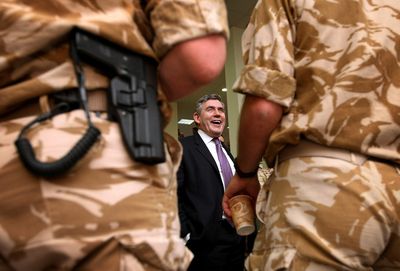British leader sets July for departure from Iraq
Its forces are based in south, which has quieted down again

BAGHDAD – Prime Minister Gordon Brown of Britain said Wednesday that British forces will depart Iraq by the end of July, leaving the United States as the only major foreign military presence in the country.
In Baghdad, meanwhile, nine people were killed in a pair of bombings in the center of the city. At least 43 more were injured when a car bomb and a roadside bomb exploded in sequence.
The British withdrawal of its remaining 4,100 troops had been long anticipated. Their forces will cease operations by May 31 to begin the departure. In the future, the British military might still send soldiers to train Iraqi forces if the Iraqi government requests.
At least 178 British troops have died in Iraq since the March 2003 U.S.-led invasion, which has grown increasingly unpopular in Britain and became a liability to the governing Labor Party under Brown’s predecessor, Tony Blair.
When Brown became prime minister in 2007, he made clear that he planned to greatly reduce the British presence in Iraq. His initial plan, to bring the British troop strength down to about 2,500 by end of last year and to withdraw completely by the end of 2008, stalled after an Iraqi army offensive prompted major clashes with Shiite Muslim militias last spring in the southern city of Basra, where the British contingent is based.
Since then, southern Iraq has quieted down again, and Iraqi police and army are now patrolling the crucial region, home to strategic oil reserves and the country’s sole ports.
Brown and Iraqi Prime Minister Nouri al-Maliki, at a news conference during Brown’s unannounced visit, said violence has fallen in the south and Iraqi security forces are better equipped to stand on their own.
Brown’s visit came a day after Iraq’s Cabinet passed onto Parliament a resolution outlining the withdrawal timetable. Brown urged Iraq’s national Parliament to approve the pact.
It is similar to the Status of Forces Agreement governing the U.S. troop presence that was approved by Parliament on Nov. 27. It takes effect Jan. 1 and replaces the United Nations mandate – expiring that day – which oversees the role of foreign forces in Iraq.
The pact governing the British operation also includes about 500 troops from Australia, Romania, Estonia and El Salvador. It is not clear whether the remaining forces would adhere to the July 31 deadline.
The U.S.-led operations in Iraq once included forces from at least 39 countries, with a very small number contributing more than 1,000 soldiers and some offering less than 100. Major contributors such as Georgia, Ukraine, Poland, Italy, South Korea and Spain withdrew their combat forces over time since 2003.